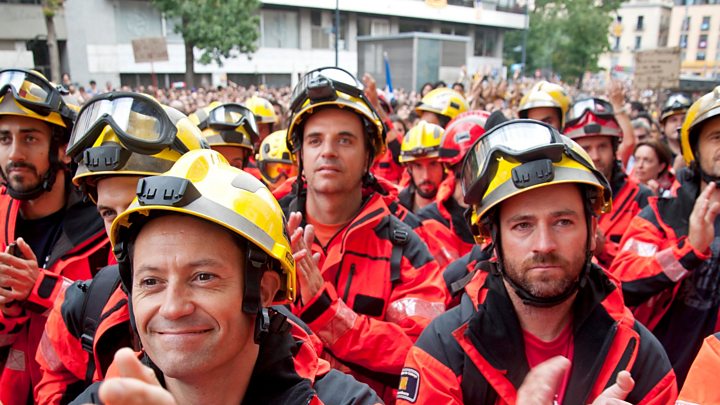
Thousands of people in Catalonia are rallying and blocking roads in protest over Spanish police violence during Sunday's independence referendum.
There is little public transport across the region, after local trade unions called a strike. Barcelona's port was at a standstill, union sources said.
Almost 900 people were hurt as police tried to prevent the vote. Thirty-three police officers were also injured.
The central government in Madrid said the referendum was illegal.
- Catalonia beset by divided loyalties
- Spain's biggest crisis for a generation
- The reasons for the referendum
On Tuesday, about 300,000 people took to the streets of Barcelona, city police were quoted as saying by the AFP news agency.
Some demonstrators were marching towards the Catalan parliament.
More than 50 roadblocks in the city caused big traffic jams. Barcelona's metro traffic was cut to a 25% service during rush hour and no trains at all at other times.
Top tourist attractions were also closed, including the city's famous Sagrada Familia church.
Mercabarna - Barcelona's massive wholesale market - was left deserted as some 770 food businesses closed for the day.
However, the city's El Prat airport and its taxis are operating normally.
Protest rallies are also taking place in other major cities and towns of the north-eastern autonomous region.
Many small businesses have shut for the day. Schools, universities and medical services are also closed or operating at a minimum level.
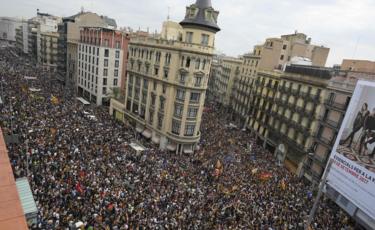 AFP
AFP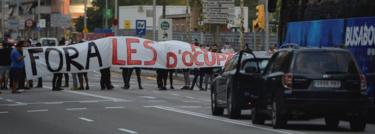 REUTERS
REUTERSThe strike was called in protest at "the grave violation of rights and freedoms" seen during Sunday's ballot.
Some police officers were seen firing rubber bullets, storming into polling stations and pulling women by their hair.
Spanish Prime Minister Mariano Rajoy has said the vote made a "mockery" of democracy.
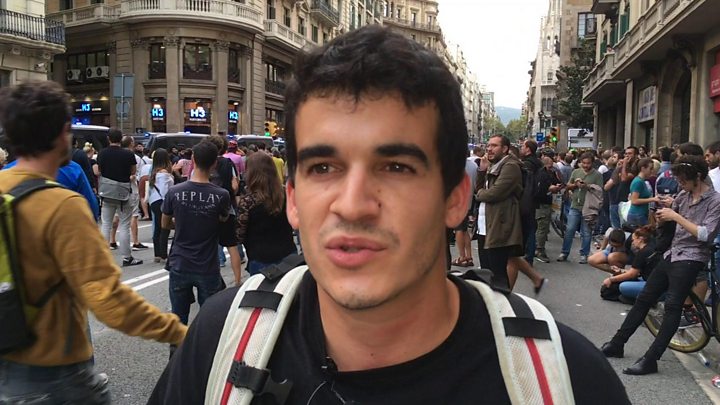
On Tuesday, Spanish Interior Minister Juan Ignacio Zoido said: "We see how day after day the government of Catalonia is pushing the population to the abyss and inciting rebellion in the streets."
He also warned that the central government would take "all measures necessary to stop acts of harassment".
Meanwhile, Deputy Prime Minister Soraya Sáenz de Santamaría condemned the "mafia" behaviour of those protesters who had earlier gathered around hotels housing Spanish police officers and demanded that they leave.
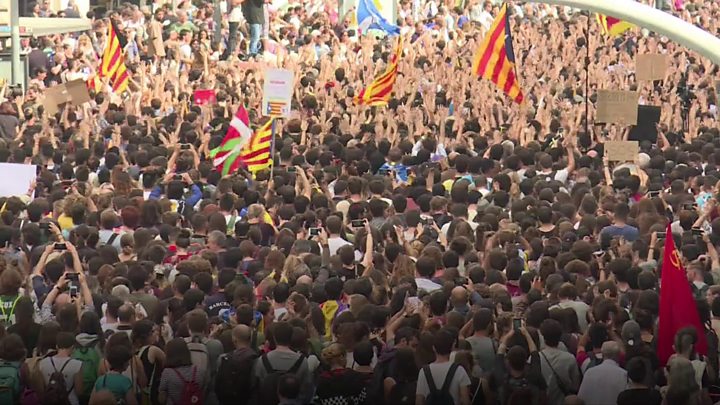
On Sunday, more than 2.2 million people reportedly voted in the referendum. The Catalan government says the vote in support of independence was nearly 90%, but official results have not yet been released.
Turnout was relatively low at a reported 42%, potentially weakening the position of Catalan President Carles Puigdemont.
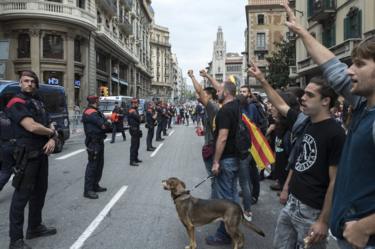 EPA
EPA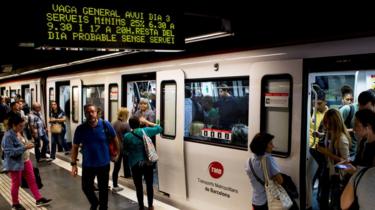 EPA
EPA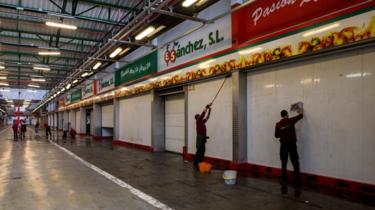 EPA
EPAOn Monday evening, the Spanish national football team abandoned a training session in Madrid after fans booed and whistled at defender Gerard Pique, who has strongly backed the Catalan referendum.
Guardia Civil police mingled among the crowd, as some fans waved Spanish flags and anti-Pique placards.
Pique plays for FC Barcelona, which announced that it had joined the strike. "None of the professional teams or the youth teams at FC Barcelona will train tomorrow," the club said on Monday evening.
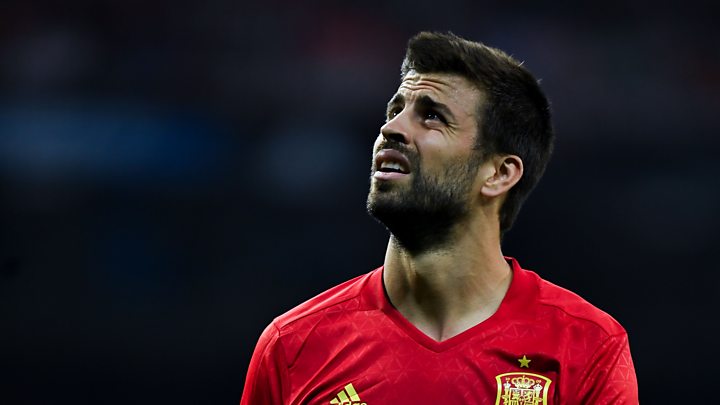
'The street will always be ours'
Patrick Jackson, BBC News, Barcelona
Drumbeats thunder and echo up and down Laietana Street, where last night's anti-police protest of hundreds outside the city's National Police HQ has swollen into a roaring human river above which bob the lone-star flags of Catalan independence.
As a surveillance helicopter's blades beat time overhead, vans of the local Mossos police slowly negotiate the alleys as the force fulfils its peculiar role as both guardians of their national colleagues, and heroes of the crowd who cheer and chant: "Our police are here."
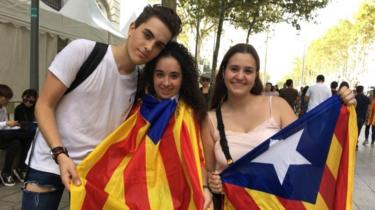
"It's more than a flag, it's like a feeling," says Roger Mayor, 18, as his friends show off the flags they are wearing.
"We think the Spanish government just want us for the money and they hate us. The Spanish police actions on Sunday were surreal. It felt like being in a horror film. We spent all day in a school [polling station] and we were very scared, though the police didn't come."
Xavi Alba, 28, and his mates pass by with a shopping trolley draped in the Catalan communist flag as the crowd chants: "The street will always be ours". It's stuffed with beer mostly, he explains while drinking a can.
"We go around Barcelona occupying the streets to protest at the repression. It's not about independence, it's about democracy. When we see people with Spanish flags, we just hug them. Yeah, they hug us too!"
Meanwhile, political leaders are trying to find a way forward.
Mr Puigdemont has said he wants a new understanding with the central government in Madrid, but the Spanish government has warned it could suspend autonomy of the wealthy north-eastern region.
Given the chaotic nature of the vote, the turnout and voting figures should be taken with a pinch of salt, says the BBC's Tom Burridge in Barcelona.
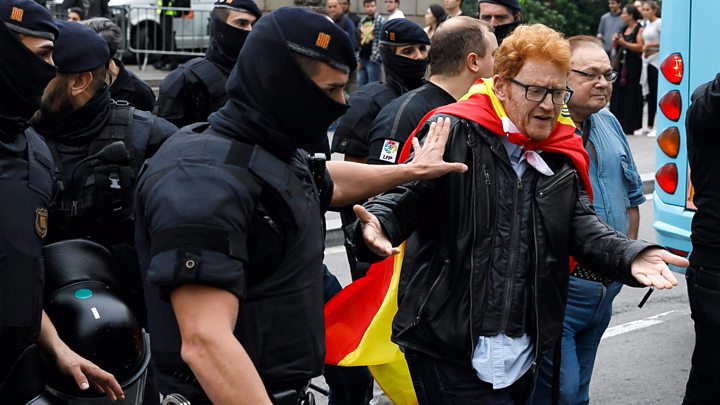
Mr Rajoy held talks with Pedro Sánchez, leader of Spain's main opposition Socialist party, as well as Albert Rivera, the head of the centrist Ciudadanos party, late on Monday.
While the Socialist leader urged Mr Rajoy to hold talks with the Catalan president immediately, Mr Rivera said Spain should invoke article 155 of the constitution, in effect suspending Catalonia's autonomous powers.
Mr Puigdemont has called on the international community to help mediate between the two sides.
However, the European Commission described the crisis as "an internal matter" for Spain, that has to be dealt with in line with the constitutional

No comments
Post a Comment
Comment, and tell people what you think